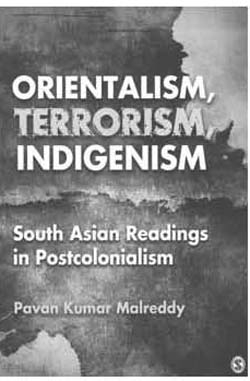Pavan Kumar Malreddy’s slim volume discusses and synthesizes three concepts with concrete examples: orientalism, terrorism and indigenism (Dalit Bahujan movements), with an involved reading of academic literature as well as the popular media. He draws from the contemporary literary studies in South Asia to discourse on orientalism and contemporary manifestations of terrorism (9/11 for example). What gets highlighted in the process are contradictions inherent in the way South Asia has viewed and comprehended postcolonialism, as analysed in the Subaltern Studies and the way the West has viewed it. The book makes an attempt to position Orientalism in a postcolonial world in transition with terrorism and identity-based cleavages occupying axis-space for discussions. The use of the work of prominent literary figures from South Asia to analyse the three concepts is an innovative analytical tool in the study.
The three chapters in Section I examine the discourse in the western literature on orientalism and terrorism. The author effectively brings out how following 9/11, violence and terrorism were superimposed as categories to the ‘Orient’ in the western literature. 9/11 indeed was not an ordinary event, it was a challenge to the only world power, and Malreddy rightly observes that beyond the ‘war on terror’ in rhetoric, policies and actions, it provided justification for redemptive violence. The world suddenly became a dangerous place and the ‘Orient’ became the source of the danger—new paranoias, distrust, profiling and exclusions overtook the western world. He quotes Edward Said, ‘If a westerner kills his fellow civilians, he is a crazy loner, if an Oriental kills his fellow civilians, he is the good old terrorist; and if the same Oriental kills Western civilians, he is the new terrorist.’ ‘Home-grown’ and/or ‘foreign-grown’ as categories for distinguishing terrorism in orientalist and western contexts are an interesting differentiation, where terrorist violence emerging from foreign soil is depicted as dangerous, adversarial and antithetical to the civilizational norms of the West. Malreddy perceptively observes, ‘From the colonial anthropometry to the American geopolitics, and to counter-terrorism studies, the saga of mapping, farming, and criminalizing the Orient continues until today.’ And to counter such a mindset, he cautions against ‘pulp literature’.

